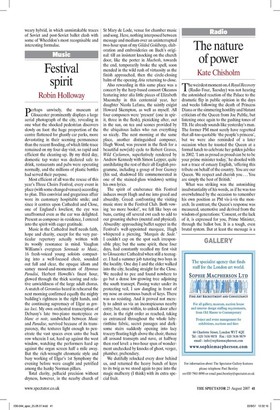Festival spirit
Robin Holloway perhaps unwisely, the museum at 1 Gloucester prominently displays a large aerial photograph of the city, revealing in one what the shocked pedestrian discovers slowly on foot: the huge proportion of the centre flattened for ghastly car parks, more devastating in their seeming permanence than the recent flooding, of which little trace remained on my four-day visit, so rapid and efficient the cleaning-up. By my third day, domestic tap water was declared safe to drink, restaurants and pubs were operating normally, and the millions of plastic bottles had served their purpose.
Most efficient of all was the rescue of this year's Three Choirs Festival, every event in place (with some changed venues) according to plan. This convivial and gregarious affair wore its customary hospitable smile; and since it centres upon Cathedral and Close, one of England's loveliest, the eye was unaffronted even as the ear was delighted. Present as composer-in-residence, I entered into the spirit with eager gratitude.
Music in the Cathedral itself needs faith, hope and charity, except for the very particular repertory actually written with its woolly resonance in mind. Vaughan Williams's evergreen Serenade to Music, 16 fresh-voiced young soloists compacting into a well-focused choir, sounded out full and clear, the opaque idiom and samey mood-and-momentum of Hymnus Paradisi, Herbert Howells's finest hour, glowed through the thick scoring and relative unwieldiness of the large adult chorus. A snatch of Gerontius heard in rehearsal the next morning confirmed equally the mighty building's rightness in the right hands, and the continuing supremacy of Elgar as genius loci. My own orchestral transcription of Debussy's late two-piano masterpiece en blanc et noir, sandwiched between Music and Paradise, survived because of its transparency, the textures light enough to penetrate the vast spaces even unto the back row wherein I sat, hard up against the west window, watching the performers hard up against the organ screen half a mile away. But the rich-wrought chromatic style and busy working of Elgar's 1st Symphony the evening before were caught and petrified among the hunky Norman pillars.
Total clarity, pellucid precision without dryness, however, in the nearby church of St Mary de Lode, venue for chamber music and song. Here, nothing interposed between message and medium over an uninterrupted two-hour span of my Gilded Goldbergs, elaboration and embroideries on Bach's original: till an insistent knocking on the church door, like the porter in Macbeth, towards the end, temporarily broke the spell, soon mended in the wild rush of virtuosity as the finish approached, then the circle-closing balm of the opening Aria returning to close.
Also rewarding in this same place was a concert by the harp-based consort Okeanos featuring inter alia little pieces of Elizabeth Maconchy in this centennial year, her daughter Nicola Lefanu, the saintly exigist Howard Skempton, as well as myself. All four composers were 'present' (one in spirit, three in the flesh), picnicking after, out in the sun, on tea and scones provided by the ubiquitous ladies who run everything so nicely. The next morning at the same place, another distinguished composer, Hugh Wood, was present in the flesh for a beautiful new(ish) cycle to Robert Graves, Wild Cyclamen, superlatively rendered by Andrew Kennedy with Simon Lepper, quite annihilating the rest of their all-English programme, including a group of Ivor Gurney (his sad, shadowed life commemorated in one of the stained-glass windows) setting his own lyrics.
The spirit of exuberance this Festival induces swept Hugh and me into greed and absurdity. Greed: confronting the visiting music store in the Festival Club. Both vowing 'no more books!', we fell like boys on buns, carting off several cwt each to add to our groaning shelves (mental and physical). Absurdity: approaching buffet supper in the Festival's well-appointed marquee, Hugh whispered a piercing, 'Marquis de Sade.' I couldn't cap on the spot such irresponsible play; but the same spirit, these four days, had constantly recalled my first visit to Gloucester Cathedral when still a teenager. I had a summer job tutoring two boys in the locality. One day I and the elder walked into the city, heading straight for the Close. We needed to pee and found nowhere to go but a dense low-growing tree adjoining the south transept. Passing water under its protecting veil, I saw dangling in front of my nose an enormous bunch of keys. There was no resisting. And it proved not merely to admit us via an inconspicuous nearby entry; but, once within, to unlock door after door, in the right order as reached, taking us entranced throughout the whole labyrinthine fabric, secret passages and darksome stairs suddenly opening into lacy tracery floating high above the choir; thence all around transepts and nave, at halfway then roof level: a two-hour span of wonderment unchecked by knocks of ghost, verger, plumber, prebendary.
We dutifully relocked every door behind us, and returned the heavy bunch of keys to its twig as we stood again to pee into the magic mulberry (I think) with its extra special fruit.









































 Previous page
Previous page